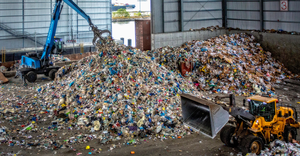Rise and Whine
"Freakonomics" author gets up early to bash recycling.
The long-running "Good Morning America" is ABC's wake up and have a good day radio and television show. Light on substance, long on fluff, GMA avoids controversy because no one wants to start their day by getting mad and spilling their coffee.
Unfortunately for recyclers, a mid-July segment caused a lot of hot coffee to hit the floor. Guest commentator Steven Dubner, co-author of the contrarian best-seller, “Freakonomics,” made a number of assertions about recycling. Some were accurate, and some weren't. The heart of his comments was that whether or not recycling is good for the environment depends on the product involved. In itself, that's a pretty harmless statement. He also pointed out the importance of reducing waste and of reusing materials and made a number of positive statements about recycling metals.
However, he trashed water bottle recycling with the same fervor that he trashed water bottles themselves. Dubner said that PET bottle recycling was messy and not worth the effort. He also noted that bottled water is wasteful when tap water is just as good and doesn't need the packaging. Oddly, none of the recyclers he upset complimented him on his common sense about bottled water.
But recyclers were most outraged by Dubner's comments about newspaper recycling. According to Dubner, newspaper recycling is also messy, requires a lot of effort, and is environmentally harmful because we have to wash and chop up newspapers. He said the good news is that we have plenty of tree farms. Alas, it never occurred to him that trees have to be cut down, chopped up, washed and converted into pulp. Oops.
He then made the remarkable claim that no markets exist for old newspapers and that cities dump the collected newspapers in landfills! Note to Steve: fire your research intern! No markets for old newspapers? What planet is he living on? We have been blessed with the best, most stable newspaper markets in years. Both domestic and international markets are clamoring for old newspapers that they can use as a cost-efficient raw material. How did he miss this? As to dumping newspapers into landfills, why would anyone bury money?
The reaction from recyclers was predictable. Message boards and e-mail boxes lit up with outraged comments. Recycling companies and their trade and professional associations wrote pointed letters to ABC promoting their recycling activities and noting inaccuracies in the GMA segments.
Did they overreact? The two segments got little play in the rest of the media. Dubner promoted waste reduction and reuse over recycling, just as the hierarchy does. Yes, he got some of his facts wrong. But the dilemma for recyclers is simple: remain silent in the face of these inaccuracies and give them credibility, or answer them, repeating the falsehood. Either course is risky, but silence is riskiest.
Let's remember that 300 million people live in this country. I can't think of any issue on which all 300 million of us agree. Recyclers were once the contrarians, advocating a different way of managing part of the waste stream. Now recyclers are mainstream and don't appear to appreciate challenges. The best response, or if you will, the best revenge, is simply to continue to operate cost-efficient and effective recycling programs. And don't forget to keep selling those newspapers!
Opinions in this column do not necessarily reflect the National Solid Wastes Management Association or the Environmental Industry Associations. E-mail the author at: [email protected].
The columnist is state programs director for the Environmental Industry Associations, Washington, D.C.
About the Author(s)
You May Also Like




